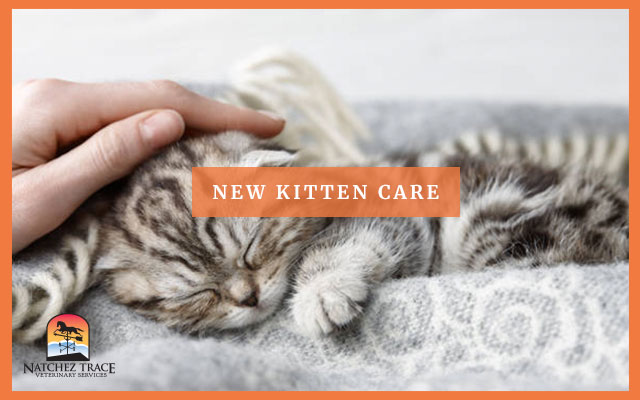Kitten Care: About Your New Kitten
Congratulations on selecting a kitten as your pet! You have chosen a very clean pet with amazing skills for hunting. Your new pet will probably need only a little house training because its mother has already taught it to use the litterbox. A kitten is one fuzzy little package of perfect companionship. Both males and female cats are affectionate, playful and intelligent. We have created this guide with a few tips on kitten care and what to expect when having one as a pet.
Your kitten will be content living its entire life indoors if you provide the following:
- Regular meals
- Clean litter
- Grooming
- Attention in the form of play
- Companionship
New Kitten Care: The Basics
Unless you plan to breed your cat, neutering is recommended to keep males from spraying, and females from producing unwanted litters. Neutering and spaying should be performed at 6 months of age.
Needed supplies for a new kitten include:
- A proper health record with dates of vaccinations and dewormings
- High-quality food
- Bowls for water and food
- A litter pan with litter and scoop,
- Kitten shampoo
- Grooming tools
- Pet carrier
- And of course… TOYS!
Kitten Care: Bringing Kitten Home
Prepare your home for the new kitten before letting it loose. Be sure all doors and windows are closed to prevent escape. Place the kitten’s bed (crate) in a secluded area and the litter box in another secluded area. Take the kitten out and let it explore the room where it is to stay.
Kittens and cats will explore endlessly until it feels totally comfortable in the surroundings. When the kitten becomes comfortable, its tail will go straight up. Once it feels comfortable, it will start to groom itself.
A plastic carrying crate is a great idea for trips and also as your kitten’s bed at home. It will give the kitten a private place that offers security. It should be placed a couple of inches off the floor.
Kitten Care: Litterbox Training
Show the kitten the litter box, and place the kitten in it several times. It’s rare for a kitten to reject the box. If this does happen, the litter box should be moved to another more secluded area. If the problem continues, it may be necessary to place several boxes around the home. The kitten will find one that suits its need for privacy within 24 hours. Remember, cats are extremely clean pets.
Click Here to Read About How to Eliminate Cat Litterbox Problems
New Kitten Care: Food and Water
Unlike most pets, cats remain true to their “meat-eater” heritage and have special food requirements. Cats cannot process vitamins directly from vegetables, so a cat must eat the meat of animals that can convert vegetable vitamins to a digestible form. That’s why, in the wild, a cat must eat ALL of its prey’s carcass to derive essential proteins, minerals, and vitamins. Taurine, for example, is an amino acid that is vital to eyesight. Non-meat eaters can make taurine in their body, but cats cannot. Therefore, they must eat foods that contain taurine.
Commercial diets for cats must be balanced and nutritional, specialized, and concentrated in small portions. This is why feline foods are slightly more expensive than dog foods. Wet or dry food for kittens should contain 30-40% protein.
Kittens need high-quality kitten food. They can be fed “free-choice”. Only put out what the kitten will probably eat in the one day period. It is best to put fresh food out every day. Feed the kitten some canned food for the first couple of weeks if it is small or does not eat well.
Water is very important to kittens! Insufficient fluid intake can cause the urine to become too concentrated and lead to urinary stone problems. Grown cats should drink a cup of water daily. Cats do not have a“thirst” reflex, which means cat’s do not sense the need to drink. Keep an eye on your kitten’s water intake to make sure it is getting enough.
If a kitten does not eat well within the first 36 hours in the new home, it might be because it misses familiar surroundings. You might need to force feed the kitten to stimulate appetite. We also recommend feeding some strong smelling canned foods during the early growing months.
The major appetite stimulant for kittens is SMELL!! Since dry foods do not have as strong a smell as canned foods, some cats are more reluctant to eat dry food. Make diet changes slowly. Any abrupt change can cause digestive upsets resulting in vomiting and/or diarrhea.
Milk is not necessary for a kitten’s diet. Never feed a kitten milk without first diluting it at least half with water.
NEVER GIVE A KITTEN TYLENOL OR ASPIRIN!
Click Here to Read More about Feeding Kittens
Click Here to Learn about the Holistic Pet Food Created by Our Veterinarians
New Kitten Care: Sleep Time and Play Time
Make sure you allow the kitten plenty of rest time. Kittens sleep about 22 hours each day. Adequate rest is necessary for optimum growth and development. Don’t worry if your kitten shakes while it is sleeping. This is “mother nature’s way” of exercising the muscles.
Protect your kitten from swallowing foreign objects. Oftentimes, surgery must be performed to remove foreign objects from a kitten’s stomach and intestinal tract. These objects include string, fishing line, marbles, needles, or just about any other small object you can think of.
By reducing stress and allowing the kitten to feel comfortable on its own terms, you will enjoy many years of affection, love, and loyal companionship from your new kitten!








